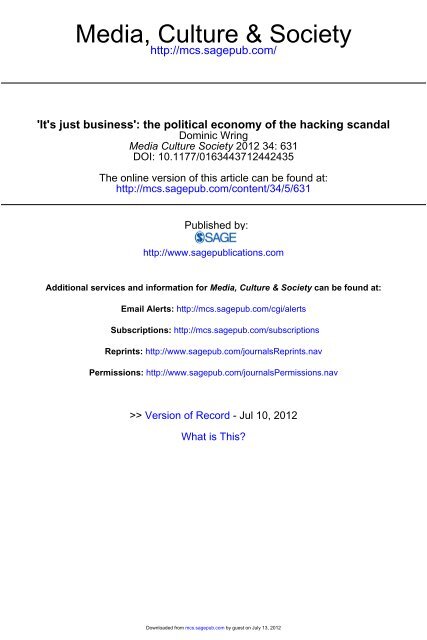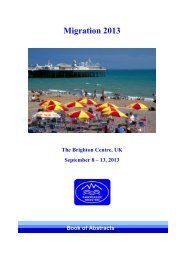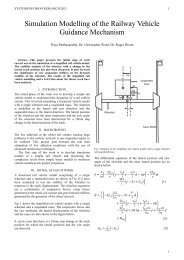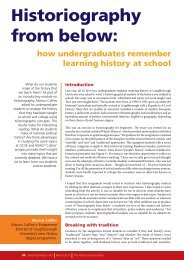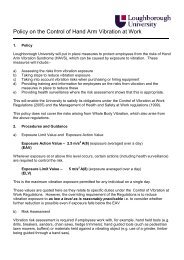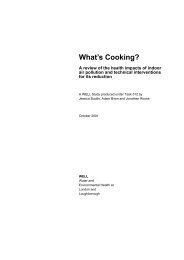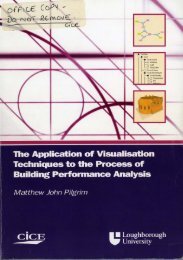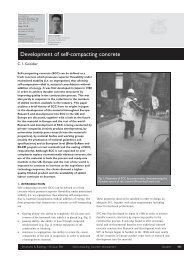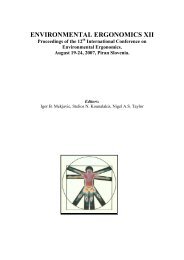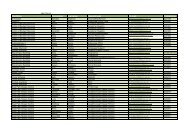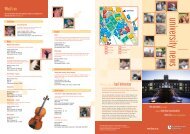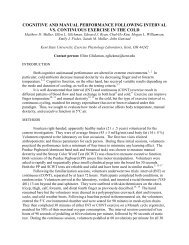Media, Culture & Society - Loughborough University
Media, Culture & Society - Loughborough University
Media, Culture & Society - Loughborough University
Create successful ePaper yourself
Turn your PDF publications into a flip-book with our unique Google optimized e-Paper software.
<strong>Media</strong>, <strong>Culture</strong> & <strong>Society</strong><br />
http://mcs.sagepub.com/<br />
'It's just business': the political economy of the hacking scandal<br />
Dominic Wring<br />
<strong>Media</strong> <strong>Culture</strong> <strong>Society</strong> 2012 34: 631<br />
DOI: 10.1177/0163443712442435<br />
The online version of this article can be found at:<br />
http://mcs.sagepub.com/content/34/5/631<br />
Published by:<br />
http://www.sagepublications.com<br />
Additional services and information for <strong>Media</strong>, <strong>Culture</strong> & <strong>Society</strong> can be found at:<br />
Email Alerts: http://mcs.sagepub.com/cgi/alerts<br />
Subscriptions: http://mcs.sagepub.com/subscriptions<br />
Reprints: http://www.sagepub.com/journalsReprints.nav<br />
Permissions: http://www.sagepub.com/journalsPermissions.nav<br />
>> Version of Record - Jul 10, 2012<br />
What is This?<br />
Downloaded from<br />
mcs.sagepub.com by guest on July 13, 2012
442435MCS34510.1177/0163443712442435Wring<strong>Media</strong>, <strong>Culture</strong> & <strong>Society</strong><br />
2012<br />
Commentary<br />
‘It’s just business’: the political<br />
economy of the hacking scandal<br />
Dominic Wring<br />
<strong>Loughborough</strong> <strong>University</strong>, UK<br />
<strong>Media</strong>, <strong>Culture</strong> & <strong>Society</strong><br />
34(5) 631 –636<br />
© The Author(s) 2012<br />
Reprints and permission:<br />
sagepub.co.uk/journalsPermissions.nav<br />
DOI: 10.1177/0163443712442435<br />
mcs.sagepub.com<br />
Collecting an award at the 2009 Edinburgh Television Festival actor Dominic West used<br />
the opportunity to make a telling point:<br />
I heard two things here yesterday – David Simon said The Wire is essentially about what<br />
happens to a country when it embraces unchecked free market economics. The next thing I<br />
heard was Mr Murdoch saying that the only guarantee of quality and independence is profit. So<br />
I accept this on behalf of everyone at The Wire with gratitude and in contempt of the Murdoch<br />
doctrine. 1<br />
West was responding to the MacTaggart Memorial Lecture given by Rupert’s son and<br />
heir apparent James that had attacked the ‘chilling’ impact of the BBC on the UK media<br />
market. The term he deployed is a more fitting description of the Murdoch influence on<br />
British politics and the reasons for this will be explored. Ultimately this is a story of<br />
complicity that was only confronted following revelations that a dead child’s phone had<br />
been hacked by agents supplying what had long been the UK’s best-selling newspaper,<br />
the News of the World.<br />
The Coalition’s decision to launch the Leveson Inquiry follows decades of government<br />
reluctance to act in a domain where there has been mounting evidence of press<br />
abuses. There are several reasons for this and most are directly or indirectly linked to the<br />
pervasive force of the Murdochs’ News Corporation. However it is not the case that<br />
British politicians have been slow to criticize the press and broadcasters in the recent<br />
past. When Tony Blair chose to speak up against what he denounced as ‘feral media’<br />
during the final days of his premiership he was uniquely placed to offer a candid assessment<br />
of news journalism and its failings. Yet it was difficult to take seriously the views<br />
of a Prime Minister whose valedictory address on the subject floated the idea of a statutory<br />
regulatory framework to cover newspapers just as he was about to retire from an<br />
office in which he had had a decade and considerable political capital to do something<br />
Corresponding author:<br />
Dominic Wring, <strong>Loughborough</strong> <strong>University</strong>, Ashby Road, <strong>Loughborough</strong> LE11 3TU.<br />
Email: d.j.wring@lboro.ac.uk<br />
Downloaded from<br />
mcs.sagepub.com by guest on July 13, 2012
632 <strong>Media</strong>, <strong>Culture</strong> & <strong>Society</strong> 34(5)<br />
about this. Similarly unconvincing was his chosen target for criticism, The Independent,<br />
the daily with the lowest circulation of any national newspaper. Blair was himself part of<br />
the problem rather than the solution.<br />
Blair’s professed opinions on the media closely resembled those of journalist John<br />
Lloyd, one of his leading supporters in the press. In the run-up to the most controversial<br />
decision of the former premier’s career, the invasion of Iraq, Lloyd was among those<br />
commentators who provided the strongest public support for taking military action.<br />
During this time the journalist was also preparing What the <strong>Media</strong> Are Doing to Our<br />
Politics (2004), his influential study that took issue with some of those who had questioned<br />
Blair over his motives in supporting the American-led campaign. Lloyd criticized<br />
media observers who:<br />
claimed the right to judge and to condemn; more, they have decided – without being clear about<br />
the decision – that politics is a dirty game, played by devious people who tell an essentially<br />
false narrative about the world and thus deceive the British people. (2004: 20)<br />
An example of this was Andrew Gilligan, defence correspondent for Radio 4’s Today<br />
programme, who famously reported the Blair government had ‘sexed up’ the case for<br />
invading Iraq. Both Gilligan and the BBC management that defended him featured as<br />
prominent targets of a wide-ranging critique which suggested that ‘the threat the media<br />
now pose to democratic institutions … is ironically at its greatest when the media are<br />
apparently at their most fearless’ (Lloyd, 2004: 13–17).<br />
Lloyd focused on the perceived shortcomings of British news and current affairs in a<br />
book informed by comments from interviewees including key Blair advisers Alastair<br />
Campbell and Philip Gould. Unsurprisingly, this account hardly dwelt on the workings<br />
of a Downing Street operation that had become synonymous with ‘spin’. And, like Blair<br />
in his valedictory speech, Lloyd did not give due prominence to the print titles produced<br />
by News Corporation, the most powerful media group in the country and arguably the<br />
organization with greatest responsibility for the degradation of journalistic standards.<br />
Fundamentally, these critiques failed to engage with deeper structural questions relating<br />
to the political economy of the British media. Had they done so they would have had to<br />
prioritize and identify the pivotal role and influence of News Corporation’s founder<br />
Rupert Murdoch (for an insightful account of this see Page, 2003). Given recent events<br />
surrounding so-called ‘hackgate’, this omission is telling in that it suggests a reluctance<br />
to confront a proprietor who had by then acquired unique political influence courtesy of<br />
his firm’s market share. This access had, of course, begun much earlier and intensified<br />
during the Thatcher governments. Decisions made under that Prime Minister enabled<br />
Murdoch’s media company to become the largest in the UK and he repaid the favour,<br />
with the slavish adherence to her of his most popular and populist Sun and News of the<br />
World newspapers. As with so much that had happened during the 1980s, Blair and his<br />
government tacitly accepted this outcome following the advice of his strategist Gould to<br />
‘concede and move on’.<br />
The mid 1990s witnessed a period of growing partisan promiscuity within the British<br />
press arising from the mounting difficulties faced by the Major government as well as the<br />
incarnation of a more right-wing Labour leadership. Consequently Blair seized the<br />
Downloaded from<br />
mcs.sagepub.com by guest on July 13, 2012
Wring 633<br />
opportunity to cultivate Murdoch by travelling across the globe to visit him at his<br />
Hayman Island retreat. Suitably impressed the proprietor eventually ordered the Sun to<br />
endorse the Labour leader a couple of years later during the weeks before polling day in<br />
1997. Thereafter this partisan support was given in a conditional way that had never been<br />
the case for Thatcher. Thus in Blair’s final election the News of the World stated: ‘If, as<br />
we expect, Labour form the next government we put them on notice this newspaper will<br />
be watching them closely.’ For its part the Sun was initially agnostic during the campaign<br />
before eventually declaring: ‘Tony Blair – warts and all – will be the only real choice for<br />
Britain.’ In reality these papers had more of an ideological affinity with the Conservatives<br />
in their shared attitudes towards so-called ‘scroungers’, asylum seekers and unions, be<br />
they of the trade or European varieties. But Michael Howard was not about to become<br />
Prime Minister in 2005; and nor did Murdoch approve of opposition accusations that<br />
Blair had lied over Iraq.<br />
Rupert Murdoch spoke privately with Blair several times during the Iraq controversy,<br />
a crisis during which the former’s newspapers offered staunch support for the Prime<br />
Minister’s policy. The familiarity between the two men was publicly highlighted in<br />
September 2005 when, shortly after Hurricane Katrina, Murdoch said:<br />
Tony Blair – perhaps I shouldn’t repeat this conversation – told me yesterday that he was in<br />
Delhi last week and he turned on the BBC World Service to see what was happening in New<br />
Orleans. And he said it was full of hate for America and gloating about our troubles. (Gibson<br />
and White, 2005)<br />
Besides seeming to confirm Blair’s antipathy and Murdoch’s own, very real enmity<br />
towards the BBC – an odd preoccupation given the scale of the unfolding tragedy – this<br />
apparent indiscretion underlined the proprietor’s access. The incident also highlighted<br />
his cavalier attitude towards a politician he now risked embarrassing. This indulgence of<br />
Murdoch had been similarly evident following the proclaiming of Blair by the Sun as the<br />
‘Most Dangerous Man in Europe’ because of his supposedly emollient approach to his<br />
counterparts in the European Union. Arguably even more controversial – and telling –<br />
was another incident in which the newspaper opted to publish a near 1000-word handwritten<br />
letter from the premier to its editor following criticism of his government. Such<br />
grovelling demeaned the office of Prime Minister. Yet no discernible rebuke from<br />
Downing Street was forthcoming following publication of what had presumably been<br />
private correspondence.<br />
Blair’s successor Gordon Brown enjoyed a brief political honeymoon on becoming<br />
Prime Minister. But Brown’s subsequent experiences provided his opponent David<br />
Cameron with ample opportunities to cultivate proprietors in order to secure their newspapers’<br />
support. Consequently, prior to the 2010 election there was speculation that a<br />
future Conservative government would not stand in the way of News Corporation acquiring<br />
full ownership of the highly lucrative BSkyB operation it already controlled.<br />
Similarly, there was a suggestion that long-standing impartiality laws covering UK<br />
broadcasting might even be relaxed in a move that would allow Sky News to emulate its<br />
US sister channel Fox through the transmitting of highly partial reports and features.<br />
Such a move had the potential to diversify News Corporation’s electoral influence, given<br />
Downloaded from<br />
mcs.sagepub.com by guest on July 13, 2012
634 <strong>Media</strong>, <strong>Culture</strong> & <strong>Society</strong> 34(5)<br />
that its newspapers’ circulations were in decline, and with this the proprietor’s influence.<br />
Evidence of this came during the transition between the Blair and Brown governments,<br />
with BSkyB’s purchase of a 17.9 percent stake – then worth £940 million – in its rival<br />
ITV. This transaction was subjected to official review following a fierce rebuke from Sir<br />
Richard Branson, who had championed a competing bid for the stock: ‘The government<br />
are scared stiff of Murdoch. Perhaps his empire should be looked at. If you add ITV to<br />
his papers and Sky, you may as well as let Murdoch decide who becomes PM.’ When the<br />
Competition Commission subsequently ruled that News Corporation should divest itself<br />
of some of this share acquisition, the proprietor expressed dismay that due process had<br />
got in the way of his ability to bargain given how ‘politicians chickened out and punt<br />
these things to quangos’.<br />
Further evidence of unease with the political influence of News Corporation<br />
within the UK was starkly underlined in the 2010 general election. The previous<br />
autumn Murdoch had switched his support from Brown to David Cameron, thereby<br />
once again highlighting his titles’ partisan promiscuity. Many commentators interpreted<br />
this move as a demonstration of strength but in fact it can be seen as the<br />
opposite. Senior company executives were evidently distressed about the uncertain<br />
electoral outcome. Consequently when The Independent ran an advert extolling its<br />
impartiality, declaring ‘Rupert Murdoch won’t decide this election, you will’, this<br />
provoked an unexpectedly direct response from Murdoch’s son James and colleague<br />
Rebekah Brooks, who made an impromptu visit to forcefully remonstrate with that<br />
newspaper’s editor Simon Kellner in the latter’s own office. For former Sun editor<br />
David Yelland the incident was revealing because, in his view, it underlined the then<br />
growing anxieties within News Corporation over the rise of the Liberal Democrats,<br />
a party the company had previously ignored but whose rapid rise to prominence during<br />
the campaign meant the firm might be ‘locked out’ of the highest echelons of a<br />
future government involving Nick Clegg. In the event, David Cameron became<br />
Prime Minister as head of the Coalition and the Murdochs resumed their position of<br />
privileged influence within Downing Street. There was no better example of this<br />
than the presence of Andy Coulson, the former News of the World editor who had<br />
become Cameron’s director of communications in opposition and now followed him<br />
into Number Ten.<br />
Cameron’s hiring of Andy Coulson as his chief spin-doctor marked the culmination of<br />
a rapprochement between the Conservatives and News Corporation. Initially Murdoch<br />
senior had been disparaging about a politician who ‘seems to be all about image’ and this<br />
view was dutifully reflected in unflattering Sun stories about ‘Dave the Dope’, ‘Cam a<br />
Cropper’ and ‘green with a little g’. For his part, the new Conservative leader cultivated<br />
the newspaper’s editor Rebekah Brooks, accompanying her to a charity function organised<br />
by David and Victoria Beckham just prior to the 2006 World Cup. Cameron also<br />
hired Sun veteran Chris Roycroft-Davis to work on his team as a speechwriter. But it was<br />
Coulson’s appointment that came as the greatest surprise, given that his background was<br />
largely in celebrity journalism. More importantly, he had previously resigned from the<br />
News of the World following the imprisonment of the paper’s royal editor Clive Goodman<br />
in 2007. It was the supposedly sole ‘rogue reporter’ Goodman who had paid Glenn<br />
Downloaded from<br />
mcs.sagepub.com by guest on July 13, 2012
Wring 635<br />
Mulcaire for information obtained through the illegal phone tapping of aides to Windsor<br />
family members.<br />
Andy Coulson was the consummate News Corporation insider and this made<br />
him valuable to Cameron both as an adviser on media strategy and as a key link to<br />
help win over his former employer. The spin-doctor brought with him an intimate<br />
understanding of a robust newsroom culture he himself had been part of and had<br />
helped to reinforce. How confrontational this could be was demonstrated when<br />
Coulson was named in a court case brought by Matt Driscoll, a former employee.<br />
Driscoll’s central claim of endemic bullying at the News of the World was accepted<br />
and the complainant was awarded the considerable sum of £800,000. Giving evidence<br />
to the Leveson Inquiry the paper’s former news editor Ian Edmondson corroborated<br />
this account. And it is arguably this matter that brings to light another<br />
fundamental reason as to why ‘hackgate’ and the conspiracy to conceal it happened:<br />
the absence of the National Union of Journalists and other independent<br />
worker representation within News Corporation. In their place a ‘company union’,<br />
the News International Staff Association, operated, but it offered no credible support<br />
for those working in a firm where dissent was self-evidently not tolerated. The<br />
resulting fear and conformity produced the ideal environment for the bending and<br />
breaking of laws that led to a monumental invasion of privacy that has become<br />
known as ‘hackgate’.<br />
Murdoch’s antipathy towards trade unionism is well known and his newspapers<br />
have been at the forefront of campaigns of misrepresentation aimed at the Fire Brigades<br />
Union, the National Union of Mineworkers and others that are well documented. News<br />
International had, of course, engaged in its own direct confrontation with the print<br />
workers’ unions during the Wapping dispute in the 1980s. Newspaper attacks on the<br />
strikers extended to those who expressed sympathy for them, including lorry driver<br />
Terry McCabe whose refusal to cross the picket line led to malicious stories about him<br />
in the Sun. When the Press Council agreed with McCabe that he had been misrepresented<br />
the newspaper’s reaction was to dismiss the verdict and reprint a slightly modified<br />
version of the earlier offending headline ‘You are still a lying trucker’. Such<br />
contempt for so-called press self-regulation was one of the motivating factors behind<br />
successive attempts by MPs such as Tony Worthington and Clive Soley to give a statutory<br />
right of reply in order to protect ordinary people. Despite their efforts – and further<br />
scandals, including the vicious lies published by The Sun about the 1989<br />
Hillsborough tragedy – it has taken an extraordinary series of events to put this deserving<br />
measure back on the public agenda.<br />
The decision to swiftly close the News of the World was designed to protect the<br />
Murdochs’ remaining UK business interests rather than as an act of public atonement.<br />
The myth of this newspaper communing with its ‘family’ of readers was laid bare by the<br />
ruthless casting aside of what was in a reality an expendable commercial brand, not to<br />
mention the criminal acts that led up to this. As the comedian Steve Coogan told the<br />
Leveson Inquiry, his treatment by the paper revealed the self-justifying pathology of<br />
News Corporation that, to use his words, is ‘like the mafia. It’s just business.’ Underlying<br />
and sustaining this activity has been a power base long cultivated and maintained since<br />
Downloaded from<br />
mcs.sagepub.com by guest on July 13, 2012
636 <strong>Media</strong>, <strong>Culture</strong> & <strong>Society</strong> 34(5)<br />
the acquisition of the Sun in the late 1960s. At its zenith, Lance Price (2006) pithily<br />
observed of this relationship between proprietor and government:<br />
Rupert Murdoch doesn’t leave a paper trail that could ever prove his influence over policy, but<br />
the trail of politicians beating their way to him and his papers tells a different story … like the<br />
24th member of Cabinet … his presence is always felt.<br />
The ‘hackgate’ scandal has enabled a serious reappraisal of News Corporation and<br />
others’ media operations in the UK. Leveson has helped renew interest in a terrain that<br />
was long the preserve of a minority, including those belonging to the Campaign for<br />
Press and Broadcasting Freedom. The crisis should finally put an end to the fanciful<br />
idea that the Murdoch family were somehow apart from what constitutes the UK power<br />
elite. As Thomas Frank (2012) argues, plutocrats and their proxies have long justified<br />
regressive ideological agendas by couching their arguments in populist rhetoric. There<br />
is perhaps no better example of this than James Murdoch’s 2009 attack on the BBC.<br />
Fortunately the words he misused then now provide the most fitting description for a<br />
company – his own – that has threatened genuine freedom of speech because it is an<br />
‘authoritarian’, ‘elitist’ ‘establishment’ institution created by a founder (for Reith read<br />
Rupert) with ‘a pretty firm view of the need to keep the lower classes in their place’.<br />
Note<br />
1. See: ‘Edinburgh TV festival: Dominic West celebrates with anti-Murdoch speech’ (video), available<br />
at: http://www.guardian.co.uk/media/video/2009/aug/30/dominic-west-edinburgh-tv-festival<br />
References<br />
Frank T (2012) Pity the Billionaire. London: Metropolitan.<br />
Gibson O and White M (2005) BBC and No. 10 try to gloss over Murdoch indiscretion. The<br />
Guardian, 19 September. Available at: http://www.guardian.co.uk/media/2005/sep/19/broadcasting.rupertmurdoch<br />
Lloyd J (2004) What the <strong>Media</strong> are Doing to Our Politics. London: Constable.<br />
Page B (2003) The Murdoch Archipelago. London: Simon and Schuster.<br />
Price L (2006) Rupert Murdoch is effectively a member of Blair’s cbainet. The Guardian, 1 July.<br />
Available at: http://www.guardian.co.uk/commentisfree/2006/jul/01/comment.rupertmurdoch<br />
Downloaded from<br />
mcs.sagepub.com by guest on July 13, 2012


